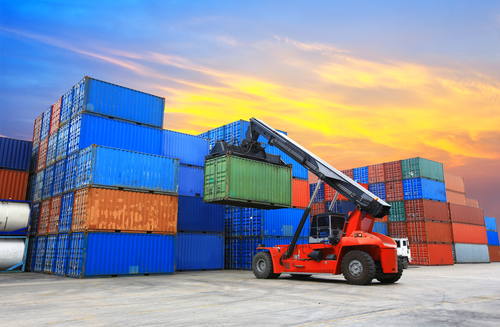By Tom Reddon
Rough terrain forklifts require the right operators to handle them or it can lead to serious accidents. The workhorses are designed to handle heavy loads and operate on challenging terrain. Most rough terrain forklift accidents are caused by operator error. The right training procedures can help your employees understand how to carefully operate the equipment to prevent serious accidents. The three most common types of accidents on rough terrain are:
- Rollovers
- Tipovers
- Collisions

And what causes the accidents? The culprits are:
- Slopes
- Dips, holes, and trenches
- Narrow aisles
- Ground and overhead obstructions
Discuss Hazards Beforehand
One of the most important things to do is hold a training session with your employees before they drive on the rough terrain. Discuss the hazards so they know what can occur if they do not practice the right safety habits when driving their forklifts. While the vehicles do move slowly, you can end up with serious problems if you do not load them correctly, and you can end up driving too quickly with the load.
1. Improve Visibility
It is important to keep the windows clean and to make sure people can see when they are driving the forklift. Do they need to wear glasses? Vision testing can help to ensure you have people who can see when they drive the forklift. Not having a clear line of sight when driving can easily cause an accident.
2. Failure to Pay Attention
How often do you find yourself dozing off when you are working? Employees often end up failing to pay attention when they work long hours, or they do the same job several times. A routine can end up causing people to get careless on their job, which can lead to wrecks. Inattention while driving is something that you need to address as it does cost the company thousands of dollars if an accident occurs.
3. Failure to Yield to Other Vehicles
Some wrecks occur when people fail to yield to other vehicles. If you hit something with a rough terrain forklift, it can end up causing major damages to the forklift and the other vehicle, not to mention the drivers. Not only do drivers need to yield to other vehicles, they need to be aware of the pedestrians who cross their paths.
4. Overloading
If your forklift is overloaded, it can cause it to tip to the side when you turn or when you are near a steep edge. Overloading the machine can be hazardous when you are trying to drive the machine forward as it is easy for the machine to be pushed to the side.
5. Misjudging Terrain
People often drive the machine on rough terrain and assume the forklift will be able to handle anything. While the machine is designed to work on rough terrain, it isn’t always set to work on all types of terrain. Misjudging terrain is something that can end up leading to serious accidents.
6. Failure to Inspect the Forklift
If a forklift is not inspected and serviced properly, it could end up with major problems. It is important to have the machine correctly maintained and inspected to provide you with adequate results.
7. Improper Loading or Unloading
Another major reason why accidents occur is due to improper loading and unloading of the forklift. A rough terrain forklift is set up to deal with a number of weights and loads, but the operator is the key source who focuses on keeping everyone safe and the machine safe.
About Our Guest Blogger:
Tom Reddon is a forklift specialist and blog manager for the National Forklift Exchange. He also sits on the Material Handling Equipment Distributors Association (MHEDA) executive dialogue team. Follow him on Twitter at @TomReddon.

4 thoughts on “7 Safety Tips for Forklifts on Rough Terrain”